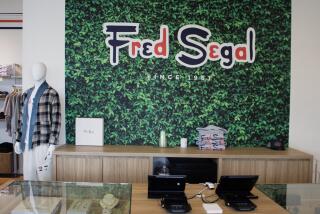On the Bandwagon
WESTMINSTER — For 20 years, the Southland’s musical instrument retail business has been as relaxed as a Brahms lullaby. The Guitar Center pretty much owns the rock ‘n’ roll business, and about 1,000 mom-and-pop stores have neatly divided up the rest.
But that serenity is about to be shattered.
New York powerhouse Sam Ash Music will spend about $11 million this year to open four Southern California stores, accompanied by a big radio advertising campaign set to begin next month. Ash’s Westminster store debuted last month; stores in Cerritos, West Hollywood and Canoga Park are scheduled to open this spring.
The upcoming battle could be a repeat of a tale that has played out in several other retail niches over the last 10 years--in hardware, electronics, toys, books, even pet supplies. The story line: superstores move into town, driving many independent merchants out of business.
The region’s $546-million musical instrument business is particularly vulnerable. Besides being very fragmented, it also has been shrinking for most of this decade. Sales have fallen in six of the last seven years, mostly due to cutbacks in school music programs.
That doesn’t bother the folks at Ash. Southern California “is the biggest consumer market in the country, and we’ve been told there’s a need for a good music store out here,” said Paul Ash, president and the 68-year-old son of Ash founder Sam Ashkenase.
That would be a dig at Guitar Center, which has nine stores in Southern California and 38 overall. It sells guitars, drums, keyboards and a host of electronic equipment to professional musicians, but not traditional instruments such as violins, trumpets, clarinets and saxophones.
Ash not only sells all of those, but also a host of other products and services such as sheet music and free lessons with purchases of more than $150. It is hoping to use that broader menu and its customer-friendly stores to gain a toehold in the region.
“The Southern California market is big enough to support both of these stores,” said Bo Cheadle, who follows Guitar Center for NationsBanc Montgomery Securities in San Francisco. “There will be price competition of some sort, but I would think it would be rational. It’s the little guys that will suffer most.”
Ash and Guitar Center have gone head-to-head in Cleveland and South Florida, and “we’re doing very well in both those markets, better than we anticipated,” said Bruce Ross, Guitar Center’s chief financial officer. “We think competition is healthy for the customer and the industry.”
Paul Ash said concerns that his company will wipe out many of the region’s independent music stores are overblown. When Ash Music moved into Edison, N.J., eight years ago, there were 19 independently owned music stores.
Today, 17 of those are still in business, and “the other two would have closed anyway because they were tired old stores,” he said. “We feel that we expand a market, not shrink it.”
But that hasn’t been the case in South Florida, where Ash has been duking it out with Guitar Center for more than a year. At least seven independently owned music stores went out of business in the last 18 months, said Mike Katz, co-owner of Music Arts Enterprises in Fort Lauderdale.
He and brother Kenneth operate that region’s largest independently owned music store, a 25,000-square-foot enterprise founded by their parents in 1963. Within a 30-mile radius are two Ash stores, two Guitar Centers and a Music and Recording Superstores, better known as MARS, an upstart chain launched by former Office Depot President Mark Begelman.
The arrival of the superstores “certainly made us grow up in a hurry,” said Katz, who has lowered prices, increased advertising and improved customer service to compete. “Before they came, we had it all to ourselves and were growing at 15% to 20% a year. Now that they’re here, we have to work our butts off just to keep our customers, but we feel good about it.”
Music Arts’ sales totaled $7 million last year, about even with 1996, Katz said.
Southland music retailers are casting a wary eye at the superstores.
“I think they are a concern to everyone,” said Ron Whittaker, owner of Whittaker Music, a full-line music store that has been in Long Beach for 51 years.
At 7,000 square feet, Whittaker Music is only one-third the size of Ash’s Westminster and soon-to-open Cerritos stores, which are likely to attract some of Whittaker’s customers.
Whittaker declined to say how he plans to combat Ash. “Hopefully, our customers are used to our service,” he said. “Sometimes price isn’t everything.”
Price, service, a broad selection and a willingness to educate beginners have been hallmarks of Ash’s strategy. “The most important part of the organization is the name: Ash,” said Sammy Ash, senior vice president and grandson of the founder.
Indeed, on the East Coast--and in New York in particular--Ash is synonymous with music retailing. The company was founded in 1924 by immigrants Sam and Rose Ashkenase, who pawned her diamond engagement ring to open a small music store in the front of their three-room Brooklyn apartment.
Their sons and grandsons presided over a gradual expansion that has since spread to six other states. The company is probably best-known for its 48th Street store--which is actually five separate stores under one roof--on Manhattan’s Music Row. It is the highest-volume music store in the country, with 1997 sales of about $60 million, and has served generations of families and prominent musicians like Stevie Wonder, Les Paul and Garth Brooks.
Guitar Center was founded in 1964 by Wayne Mitchell, a former accordion and car salesman, and for its first 16 years operated stores in Hollywood and San Francisco. In the 1980s, the company began expanding into major metropolitan markets, and today has 38 stores, primarily in California, Texas, Florida and the Northeast.
The chain is probably best known for its flagship Hollywood store, whose regular customers include rockers Eddie Van Halen and Aerosmith and legendary blues man B.B. King. The store is on Sunset Boulevard’s Rock Walk, which enshrines musical innovators and celebrities in handprints like those in front of Mann’s Chinese Theater. The Rock Walk is a favorite with tourists.
Guitar Center went public about a year ago, raising $107.5 million to pay for a 1996 recapitalization. It is the only publicly traded seller of musical instruments, and its stock is off 13% so far this year. It closed Monday at $20 on the Nasdaq, down 50 cents.
The biggest beneficiary of the budding competition will be consumers, said Sammy Ash. “They now have two quality places to shop,” he said.
Independents like Whittaker are hoping it will be a lot more than that.
(BEGIN TEXT OF INFOBOX / INFOGRAPHIC)
Music Superstores
Southern California’s musical instrument industry, dominated by small independent retailers, faces sweeping changes with the expansion of music store chain Sam Ash. A look at the company and its major competitor, Guitar Center, and the L.A.-Orange County market:
*--*
Guitar Center Sam Ash Music Founded 1964 1924 Headquarters Agoura Hills, Calif. Hicksville, N.Y. Stores 38 17 Chief executive Larry Thomas Richard Ash Ownership Traded on Nasdaq Ash family 1997 sales $296.6 million $200 million 1997 profits $10.2 million* N/A 1997 same-store sales +12% +11% Employees 1,010 810 Avg. store size 15,000 sq. ft. 22,000 sq. ft.
*--*
* Estimate
Stores Folding, Sales Shrinking
Between 1990 and 1996, the number of musical instrument retailers in Orange and Los Angeles counties declined 11% while annual sales fell 21%. The trends, with dollar amounts in millions:
Annual Sales
1996: $546.1
Dealers
1996: 1,145
Source: Sam Ash, Guitar Center, State Board of Equalization, NationsBanc Montgomery Securities
More to Read
Inside the business of entertainment
The Wide Shot brings you news, analysis and insights on everything from streaming wars to production — and what it all means for the future.
You may occasionally receive promotional content from the Los Angeles Times.










